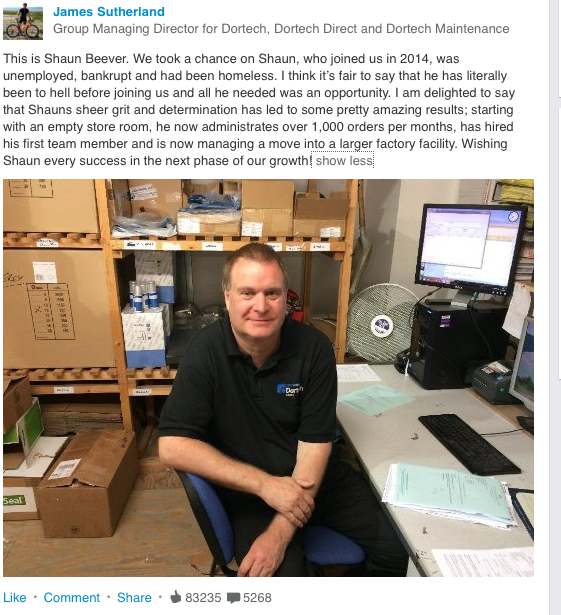
Over the past 2 months I have been volunteering with the Chattanooga Community Kitchen (CCK) helping homeless individuals in Chattanooga prepare for the job market. Every Thursday after they attend their weekly Employment class (led by Rob Lawrence), I volunteer time to help create/critique resumes and conduct mock interviews, etc.
Some of these individuals have never had a resume before and my role is to help them recognize and celebrate their skill sets/experiences that God has given them and provide encouragement in their pursuit of employment. They are pretty amazing individuals when you sit down and get to know them. I love it when I drill down and start to ask specific questions and they start rattling off all the things they have learned and can do…it is uplifting for them and myself. Every Thursday I leave in awe of their work experiences and how capable these individuals are.
My service has been an eye opening experience and is exposing me to a fragile community that once you become homeless/carless it is super difficult to overcome. The Chattanooga Community Kitchen (CCK) offers so many services to help them get on their feet (mine being one of many), but it can still be a hard road ahead. If you attend one of these meetings, you would look around and not even be able to tell that some of these people are in fact homeless. They are just like you and me! Like my most joyful friend, Valerie, photographed above.
Many times a homeless person wants to work, they DO NOT want to be homeless. Many people have found themselves in this situation based on divorce, unable to pay child-support, unhealthy/abusive family relationships, and bad decisions that sometimes end up with prison time, amongst others.
Below are just a few of the employment obstacles I have already witnessed. Some of these obstacles are so basic but when you don’t have access to them it can be life altering…
- Unreliable phone number.
- When they apply for a job, the phone number they give is a number that is no longer in service OR it is to the number to the local shelter they are staying at. (red flag to an employer)
- Infrequent access to internet.
- When an employer emails them back they might not get it for a few days until they go back to the local library and/or resource center like the CCK. (missed opportunity)
- No home address.
- I encourage them to just put the city the live in because many employers don’t use snail mail to contact applicants. Others choose to put the address of the CCK; however, many employers know the status of individuals that reside at the CCK address. (red flag to an employer)
- Relies on walking and/or public transportation.
- Limits the employers they can work for. The employer location needs to be in walking distance or very close to a bus stop. (missed opportunity)
- If an employer sees the applicant arriving/leaving the place of business on foot from an interview. (red flag to an employer)
- Reliability on public transportation can also make applicants late to work if the buses are off schedule. If the bus schedule doesn’t line up with the shift schedule, they spend many hours waiting at bus stops or at the employer location before they begin work. (red flag to an employer)
- Gaps in employment
- Gaps can be caused for prison time and/or just changing locations trying to find help with their living situation. (red flag to an employer)
- Childcare
- If a single mom is trying to find a job, this can be super challenging. A lot of times a work shift doesn’t directly line up with provided childcare. (missed opportunity)
- No High School diploma or GED
- They have work experience but they never graduated so they don’t meet the minimum qualifications and thus never get to the interview stage. (missed opportunity)
As an Employer, here are 7 STEPS you can take to help:
- Offer and encourage van or car pooling services in a certain radius or from the nearby bus stop and communicate that to local resources (like the CCK). Take advantage of Commuter Benefits provided by the government to employers and employees (subsidized or not).
- Offer public transportation stipends. Take advantage of Commuter Benefits provided by the government to employers and employees.
- Partner with community resources to find eligible candidates. Take advantage of the Work Opportunity Tax Credit.
- Invite local community resources to your site to learn more about your company so they can promote your jobs to serious candidates.
- Consider interviewing at the community resource center. (The CCK offers offices just for this purpose).
- Don’t let an address or phone number on a resume, deter you from reaching out.
- Adhere to your attendance policy, but have conversations with the intent on ‘how to make it work’. Be creative.
I certainly don’t blame employers for the red flags that are raised above. However, the cycle of homelessness continues when we, as an employer community, fail to give an opportunity to these individuals. So, I encourage you to be more open-minded in partnering with local resources to do your part and take advantage of federal tax benefits. A homeless individual has more of a reason to not lose their job because more is at risk…cold days and nights out on the streets.
I leave you with the following posting I saw on LinkedIn. This is the hope I’m talking about. Let’s make Chattanooga a better place for ALL.

There are many non-profits and churches that would love to partner with local businesses, the CCK is just one of them. If you would like to contact the CCK directly please call 423-756-4222 or email Rob Lawrence (robl@homelesschattanooga.org).


Comments are closed.